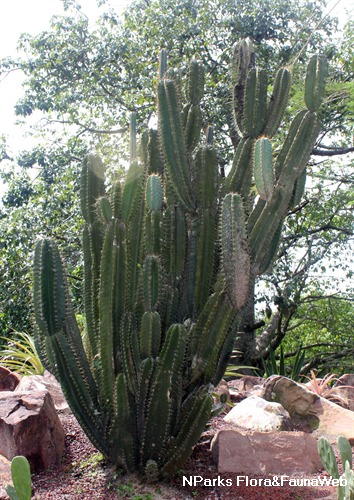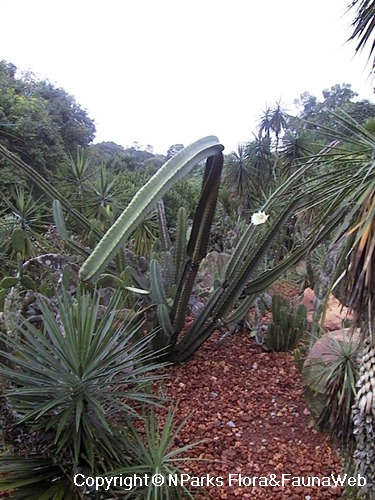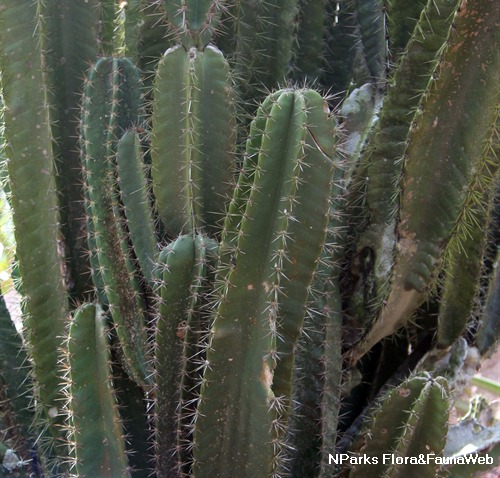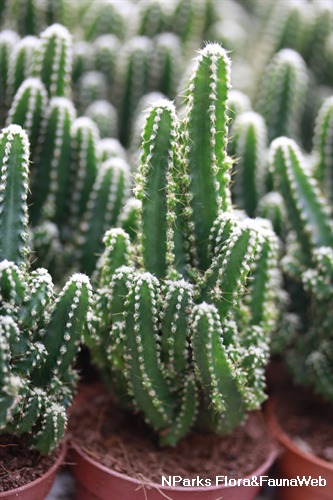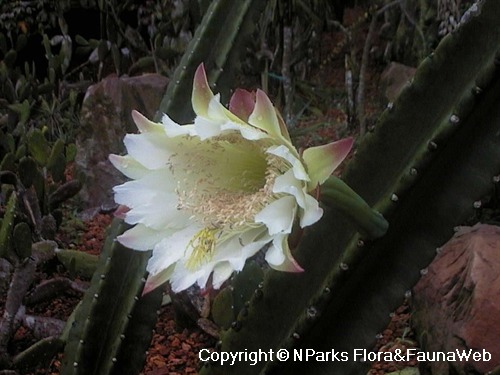
Back
Cereus hildmannianus
| Family Name: | Cactaceae |
| Synonyms: | Cereus peruvianus (trade name) |
| Common Name: | Apple Cactus, Andes Organ Pipe, Queen of the Night, 六角柱 |
Name
Classifications and Characteristics
| Plant Division | Angiosperms (Flowering Seed Plants) |
|---|---|
| Plant Growth Form | Herbaceous Plant |
| Lifespan (in Singapore) | Perennial |
| Mode of Nutrition | Autotrophic |
| Plant Shape | Columnar |
| Maximum Height | 7.6 m |
| Maximum Plant Spread / Crown Width | 4.5 m |
Biogeography
| Native Distribution | Southeastern Brazil, northern Argentina |
|---|---|
| Native Habitat | Terrestrial |
| Preferred Climate Zone | Desert / Arid |
| Local Conservation Status | Non-native (Horticultural / Cultivated Only) |
Description and Ethnobotany
| Growth Form | Clumps of erect stems grow up to 7.6 m tall. |
|---|---|
| Foliage | Leaves have been reduced to 5 cm long spines which occur in clusters of 8. The clusters are arranged along the outer edge of the ribs, about 2.5 cm apart from one another. Young stems often lack spines. |
| Stems | Green, leathery stems have 5-8 ribs and are 15 cm wide. |
| Flowers | White, trumpet-shaped flowers (15 cm wide) open at night. The center is yellow and the outer petals have reddish pink tips. |
| Fruit | Yellow to red fruits are apple-like berries (5-7 cm wide). They are oval to cylindrical and lack thorns. |
| Cultivation | This species can be grown indoors in a bright, sunny window. Even though it is a cactus, it prefers moderate water and requires soil with good drainage. |
| Ethnobotanical Uses | Edible Plant Parts : Edible Fruits Food (Fruit or Vegetable): The white flesh and numerous black seeds are edible. |
Landscaping Features
| Desirable Plant Features | Ornamental Flowers, Ornamental Stems, Ornamental Form |
|---|---|
| Landscape Uses | Interiorscape/ Indoor Plant, Container Planting |
| Thematic Landscaping | Rockery / Desert Garden |
| Usage Hazard - Cons | Spines/Thorns - Stem/Branch |
Plant Care and Propagation
| Light Preference | Full Sun |
|---|---|
| Water Preference | Moderate Water |
| Rootzone Tolerance | Drought Tolerant |
| Propagation Method | Seed, Stem Cutting (Herbaceous) |
Foliar
| Foliar Modification | Spine (marginal) |
|---|---|
| Leaf Area Index (LAI) for Green Plot Ratio | 4.5 (Shrub & Groundcover - Dicot) |
Floral (Angiosperm)
| Flower & Plant Sexuality | Bisexual Flowers |
| Flower Colour(s) | White |
|---|---|
| Flower Texture(s) | Smooth |
| Flower Grouping | Solitary |
| Flower Location | Terminal |
| Flower Symmetry | Radial |
| Individual Flower Shape | Bowl-shaped |
| Flowering Period | A Few Times Yearly |
| Flowering Opening Time | Night (dusk to dawn) |
| Flower Lifespan on Plant | 1 Day |
| Flower Size | 15 cm |
Fruit, Seed and Spore
| Mature Fruit Colour(s) | Red, Yellow / Golden |
|---|---|
| Mature Fruit Texture(s) | Smooth |
| Fruit Classification | Simple Fruit |
| Fruit Type |
Image Repository
Others
| Master ID | 504 |
|---|---|
| Species ID | 1800 |
| Flora Disclaimer | The information in this website has been compiled from reliable sources, such as reference works on medicinal plants. It is not a substitute for medical advice or treatment and NParks does not purport to provide any medical advice. Readers should always consult his/her physician before using or consuming a plant for medicinal purposes. |

